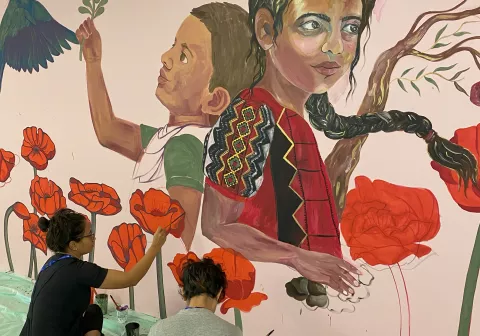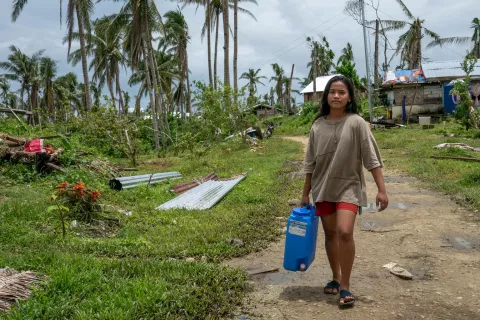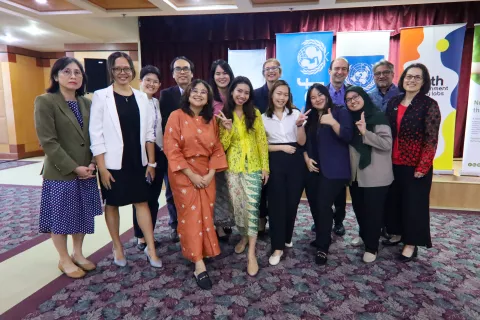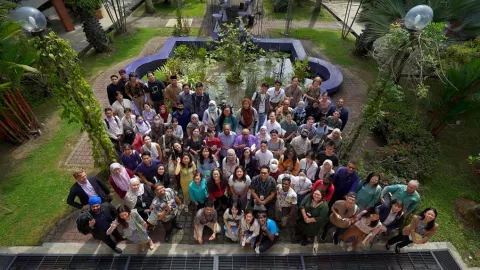Children Among the Most Vulnerable to the Impact of Climate Change
A new study by UNICEF, UKM and UMS sheds light on the impact of climate change on children in Malaysia

KUALA LUMPUR, 29 October 2021 – Landslides and flash floods cut off the only access road for orang asli parents living in Pos Kuala Mu to send their children to schools on motorcycles. During these times of extreme weather patterns caused by climate change, only 58 percent of children can attend school. This is one of the case studies found in ‘Impact of Climate Change on Children: A Malaysian Perspective’ (ICCC), which presents a comprehensive analysis of climate and environment-related impacts affecting children in Malaysia.
The joint study by UNICEF together with Universiti Kebangsaan Malaysia (UKM) and Universiti Malaysia Sabah (UMS) found that while the climate crisis encroaches on the rights of children, they are often overlooked in the design and content of climate policies and processes. The study has a special focus on marginalised groups which includes children from indigenous, undocumented, and urban poor communities.
“Climate change is arguably the single greatest challenge to the realisation of children’s rights and threatens to undercut decades of global progress in improving children’s welfare” said Dr Rashed Sarwar, UNICEF Representative to Malaysia and Special Representative to Brunei Darussalam. “UNICEF as the world’s biggest organisation advocating for children’s rights will continue to take the lead in protecting the environmental rights of children and ensuring their healthy development and wellbeing”.
The launch event held at the UKM campus and online was graced by Yang Berhormat Dato' Hajah Siti Zailah binti Mohd Yusoff, Deputy Minister, Ministry of Women, Family and Community Development. The event aims to promote engagement between policy makers and academics, highlighting key gaps and opportunities in strengthening children’s rights to a safe, clean, healthy, and sustainable environment.
The climate crisis is a threat to children’s rights
Climate change exacerbates existing inequalities and hardships for children in need. In a crisis, poorer families experience a harder time coping with external shocks. This situation is highlighted in the ICCC report, from findings based on three case studies among marginalised communities at Pos Kuala Mu, Pulau Gaya, and Projek Perumahan Rakyat Sungai Bonus. For children who are already disadvantaged, the stakes are even higher.
According to Dr Mazrura Sahani, Professor of Environmental and Occupational Epidemiology, UKM and lead researcher of the study, “Extreme weather events in these areas impacted children’s schooling and education, increased barriers to access to basic health services and supplies such as food and water, lowered family income stability, and increased susceptibility to infectious diseases, thus exposing children to a wider range of health hazards.”
Analysis of policy and legal documents shows that children are often overlooked in the design and content of climate policies and processes. Climate change and environmental degradation impact everyone on the planet – but children face additional risks of exposure and have lower tolerance levels to climate and environmental risks. While bearing the brunt of impacts from climate and weather-related disasters, such as floods and forest fires, children are the least equipped and empowered in combating climate change.
Urgent need for child-sensitive laws and policies
The ICCC report raises the alarm for interventions from policy makers and key influencers to set in place child-sensitive climate change and environmental policies in Malaysia. Presently, laws and policies relating to the environment do not recognise children as rights-holders and important stakeholders. Meanwhile, primary laws and policies governing children and public health do not address environmental issues. This gap in legal frameworks weakens the protection of children’s health and wellbeing against climate change.
Associate Professor Dr Ramzah Dambul, Deputy Vice Chancellor, Research and Innovation, UMS, and co-researcher of the study said, “The COVID-19 pandemic has revealed the complex interconnections between the environment, health and the economy based on many studies. The aftermath of the crisis is an opportune time for the country to rebuild sustainably, placing children and climate change at the top of the agenda. This must start with our National Recovery Plan. Now is the time to reimagine a world that makes children safer today, as well as tomorrow.”
The ICCC report underlines clearly what is at stake: the development and survival of children and generations to come. Through increased partnerships between development practitioners and academics, UNICEF, UKM, and UMS are working hand-in-hand to identify opportunities for the government to further ensure that all children in Malaysia are better protected from the impacts of climate variability and environmental degradation.
###
Note to the Editor
The report can be found here: https://unicef.org/malaysia/reports/impact-climate-change-children
Images and captions are shared here: https://www.dropbox.com/sh/lx360c1r2dvv5ii/AAAT_7yoQVep0FUnDriX7D7Ma?dl=0
Based on the recent UNICEF’s Children’s Climate Risk Index, Malaysia ranks 61st place on least performing countries where children are most at risk of climate change. This assessment places Malaysia under the global radar of children facing increasing vulnerabilities as projected impacts of climate change rise.
At a critical time when global policy makers are gathering at the 26th Conference of Parties (COP26) in Glasgow to contend with the impacts of climate change and renegotiate climate agreements, the ICCC report offers crucial data, informed by case series reviews, desk research, and focus group discussions, amongst others, on the impacts of climate change on children in Malaysia. The resulting evidence base strengthens the advocacy for children’s rights on climate change, providing Malaysian leaders the critical opportunity to prioritise children’s needs at COP26.
As Malaysia aligns its 12th Malaysia Plan (12MP) with the Sustainable Development Goals (SDGs), notably, SDG13 on Climate Action, the ICCC report provides an added layer of analysis and insights, strengthening the development of a comprehensive child-sensitive strategy and calling for urgent action to mitigate and adapt to climate change.
About UKM
UKM aspires to inspire the future and nurture the possibilities of its members and is committed to be ahead of society and time in leading the development of a learned, dynamic and moral society. For more information about UKM, visit: www.ukm.my
About UMS
UMS strives to be an innovative university of global standing with specific focuses on learning and teaching, research and publications, and community services. For more information about UMS, visit: www.ums.edu.my
Media contacts
About UNICEF
UNICEF promotes the rights and wellbeing of every child, in everything we do. Together with our partners, we work in 190 countries and territories to translate that commitment into practical action, focusing special effort on reaching the most vulnerable and excluded children, to the benefit of all children, everywhere.
For more information about UNICEF and its work for children, visit www.unicef.org.




